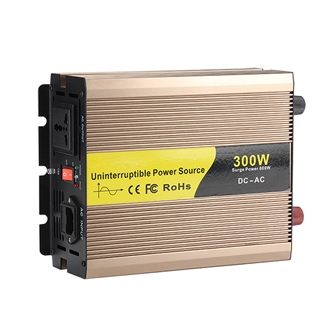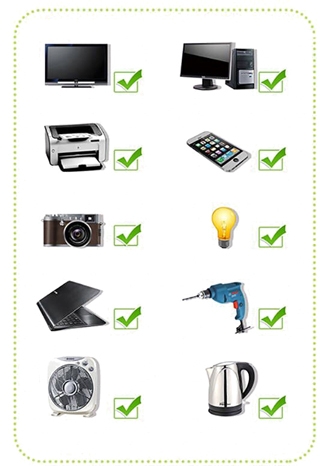In a world increasingly dependent on electronic devices and uninterrupted power supply, the choice between a pure sine wave inverter and an uninterruptible power supply (UPS) is a critical one. Both these devices are designed to provide backup power during outages, but they have distinct features and applications. In this comprehensive blog, we'll delve into the differences, advantages, and limitations of pure sine wave inverters and UPS systems to help you make an informed decision based on your specific power needs.
Pure Sine Wave UPS Inverter
- Waveform Output: A pure sine wave UPS inverter generates a waveform that closely resembles the sine wave produced by utility companies. It's a smooth, continuous, and consistent waveform with a low total harmonic distortion (THD) that is ideal for sensitive electronics. This waveform is imperative for devices like laptops, computers, and medical equipment because they are designed to run on pure and clean power. Modified or square wave inverters can produce a waveform with abrupt changes and high THD, which can cause overheating or damage to certain equipment over time.
- Applications: Pure sine wave inverters have a wide range of applications. They are suitable for residential use, powering household appliances, electronics, and even air conditioners. In commercial settings, they can run sensitive equipment, servers, and industrial machinery. These inverters are the go-to choice for off-grid systems, such as solar power setups, where you need to ensure the compatibility and safety of all connected devices.
- Efficiency: While pure sine wave UPS inverters are highly efficient, they might have a slightly lower efficiency compared to modified sine wave inverters. This is because generating a pure sine wave requires more advanced circuitry and electronics. However, this slight reduction in efficiency is often justified by the benefits of clean power, especially for devices that demand it.
- Price: Pure sine wave UPS inverters are generally more expensive than modified sine wave inverters due to the advanced technology and components required to produce a pure sine wave output. The cost can vary significantly based on the inverter's capacity, brand, and additional features. It's essential to consider your budget when choosing a pure sine wave inverter, but remember that the added cost is often justified by the protection it offers to sensitive equipment.
Uninterruptible Power Supply (UPS)
- Waveform Output: UPS systems usually provide a stepped or square wave output when running on battery power. These waveforms are simpler than a pure sine wave and have more noticeable peaks and valleys. While they might not be as clean as a pure sine wave, they are typically acceptable for most computers and basic electronics. However, sensitive equipment like high-end servers or medical devices might require additional filtering or a pure sine wave source to avoid potential issues.
- Applications: UPS systems are designed to provide short-term power backup, often ranging from a few minutes to around half an hour. Their primary role is to ensure a smooth and orderly shutdown of connected devices when a power outage occurs. They are commonly employed in business environments to prevent data loss and maintain network connectivity during brief interruptions, ensuring that critical operations can continue without disruption.
- Efficiency: UPS units are highly efficient for their intended purpose. They continuously charge their internal batteries when grid power is available, ensuring that they are ready to provide immediate backup power when needed. The efficiency level can exceed 90%, which minimizes energy waste during the charging and discharging cycles.
- Price: The cost of a UPS varies depending on its capacity, features, and brand. Basic desktop UPS units are relatively affordable, making them accessible for home and small office use. On the other hand, larger UPS units designed for data centers and enterprise environments are more expensive. The price difference reflects the capacity and capabilities of the UPS. When selecting a UPS, it's crucial to consider factors like the required runtime and the criticality of the devices it will protect.
Choosing the Right Option
- Device Sensitivity: To decide between a pure sine wave UPS inverter and a UPS, assess the sensitivity of the equipment you intend to power. Sensitive devices, like medical equipment, require a clean and stable power source. In such cases, a pure sine wave inverter is the better choice, as it ensures a reliable and safe operation without the risk of damage or malfunction.
- Runtime Requirements: The duration of power outages is a critical factor. If you need extended runtime to keep essential systems operational during prolonged outages, a UPS is the more suitable option. It's designed to provide short-term power and allow for a graceful shutdown. UPS units can be configured with additional battery capacity to meet specific runtime needs.
- Budget: Budget constraints may influence your decision. Pure sine wave UPS inverters are typically more expensive than UPS systems due to their advanced technology. Consider your financial limitations, but also weigh the importance of providing clean power to sensitive devices when making your choice.
- Application: Evaluate the specific devices and their compatibility with the output waveform. Some equipment may require a pure sine wave for reliable operation, while others can function adequately with the stepped or square wave output of a UPS. Ensure that your chosen solution aligns with your equipment's requirements for safe and consistent operation.
In conclusion, the decision between a pure sine wave inverter and a UPS depends on your power requirements, your budget, and the sensitivity of the equipment you aim to protect. Each option has its strengths and weaknesses, and making an informed choice ensures that your backup power solution effectively meets your needs and safeguards your critical equipment. If you want to purchase, welcome to inverter.com to visit.
